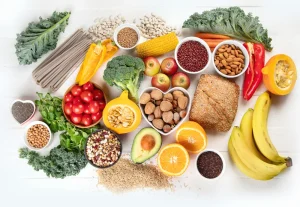Consume Less and Live Longer And yes, be disciplined to remain highly active till the last breath, no matter how tempting the meal is. Psychologically, you are most likely to be delighted.
HARA HACHI BU: This is a Japanese proverb.
“Eat till you’re 80% full,” it means. People in Okinawa, Japan are healthy and have low rates of heart disease due to their restricted dietary habits. So, what exactly does 75% or 80% full mean? It means stop eating when you are satisfied and have little space remaining. Now, how can eating less help you live a longer, healthier life and extend your health span?
Healthspan?
“Healthspan” refers to healthy aging linked with longer life. Calorie Restriction promotes the duration of the healthspan.

Let’s go through CR (Calorie Restriction): Keep it in mind. It is not necessary to diet in order to lose weight.
Calorie restriction is defined as lowering the average daily calorie intake below what is habitual, a dietary treatment that does not result in starvation or nutritional deficiency.
The National Institute of Aging (NIA) funded a groundbreaking clinical experiment called Comprehensive Assessment of Long-Term Effects of Reducing Energy Intake (CALERIE).
Participants in the calorie-restricted group had decreased risk factors for age-related disorders such as diabetes, heart disease, and stroke (lower blood pressure and cholesterol). They also demonstrated reductions in inflammatory factors and thyroid hormones. Decreased levels of these indicators are connected with a longer lifetime and a lower risk of age-related disorders, according to some data. Furthermore, no negative (and some positive) impacts on quality of life, mood, sexual function, and sleep were seen in calorie-restricted adults.(1)
Overall, the findings of multiple research demonstrate that both decreased calorie consumption (CR) and the ratio of macronutrients, namely the protein to carbohydrate ratio, have a good influence on lifespan.
“To consume fewer calories without consuming fewer nutrients,” in particular. Reduce your calorie consumption by eating properly.
According to the CDC, the average male consumes around 2,745 calories per day, while the average female consumes approximately 1,833 calories. A calorie-restricted diet, depending on how extreme a person wants to go, takes that figure and cuts it by more than one-third over time.
“Regardless of how many calories you eliminate, you will not achieve the fountain of youth unless you engage in physical exercise,” Susan Moores (spokeswoman for the American Dietetic Association) says.(2)
So, do you want to attempt calorie restriction?
The first step is to have your cholesterol and blood glucose levels examined so that you can track your improvement. Once you got the reports, you can have the experts from Droobi Health for improving your sugar levels. Now, rather than making major dietary changes, begin by substituting nutrient-deficient foods such as processed carbohydrates, sugary beverages such as soda, and so on with seasonal vegetables and fruits, whole grains, and nuts. These are some key points that can assist you in reducing calories while being healthy.
1. Increase Protein Content
A high-protein diet might help you battle cravings and feel full. Assist you in losing weight while maintaining muscle mass. Boost your protein intake by including sprouts, various types of lentils, beans, tofu, paneer (cheese), eggs, and nuts in your diet.


2. Consume More Fiber
Consume adequate amount of fruits and vegetables; decreasing calories may cause constipation. Consume at least one raw fruit every day. A plate of salad (appetizer) before the main course makes you feel full. You will consume fewer calories during the main meal.
3. Add More Liquid
More liquid does not imply sugary drinks like soda, fruit juice, or chocolate milk. Furthermore, studies demonstrate that sugary beverages raise the risk of obesity and type 2 diabetes.(3)
Drink plenty of water. Stay hydrated at all times by drinking non-caffeinated beverages, herbal teas, coconut water, probiotic drinks, and buttermilk. Hydration will aid in weight management, mental health, and the prevention of kidney cancer. Drinking water before a meal may make you feel fuller, causing you to consume fewer calories. One research, for example, discovered that drinking just 2 cups (500 ml) of water before a meal reduced calorie consumption by roughly 13%.(4)


4. Limit Your Consumption of Refined Carbohydrates and Processed Meals
Many individuals are perplexed by the phrase processed.
Let us understand: Processed products are those that have been changed from their natural condition and are ready to consume. Preservatives, additional tastes, colors, extra salt, sugar, added oils, and spices to keep it fresh for a longer length of time and to make it more appealing all contribute to the food becoming junk. It comprises quick foods, packaged foods, candy, and chocolates, among other things.
Refined carbohydrates are grains that have lost their bran and germ, such as white bread, spaghetti, chips & crackers, and white rice.
“If you eat 1000 calories of junk or processed food, your body will not digest the energy the same way it would if you ate 1000 calories of natural foods,”
It may be useful to replace refined carbohydrates with a range of nutrient-dense, fiber-rich carb sources, such as whole grains, root vegetables, nuts, seeds, and legumes.
5. Do Physical Exercises
Calorie restriction and dietary changes may cause difficulties such as mood swings and constipation owing to a reduced metabolic rate. To avoid these issues, basic exercises such as walking, swimming, jogging, and running are essential. You can join a gym for the increased aerobic activity or weight lifting for muscle mass maintenance. Exercise will boost your energy level, metabolic rate, weight reduction, and healthspan.


6. Have a decent Night Sleep
According to research (5), lack of sleep accelerates aging by interfering with physiological activities of the body such as:
- Hormonal equilibrium
- Metabolic activity
- Memory problems
- Hypertension (high blood pressure)
- Gain in weight
- Health disease risk
Sleep deprivation has long-term consequences. For health and wellness, sleep is a crucial cornerstone.
Wrapping Up
Since there is no one-size-fits-all solution to healthy eating. It is advised that sugar and other processed carbs be avoided. The underlying message is powerful: Aging may be changed. Diseases vary, yet they are always connected with aging. And calorie-restricted diets are effective.
Delaying the progression of chronic illnesses is something that everyone can get behind and enthusiastic about because no one wants to live with one.
SOURCES:
- https://www.sciencedirect.com/topics/medicine-and-dentistry/caloric-restriction
- https://www.ncbi.nlm.nih.gov/pmc/articles/PMC5685139/
- https://www.webmd.com/diet/features/restrict-calories-revive-your-life
- https://www.ncbi.nlm.nih.gov/pmc/articles/PMC2862465/
- https://www.medicalnewstoday.com/articles/198720#3
- https://www.cdc.gov/sleep/about_sleep/chronic_disease.html
